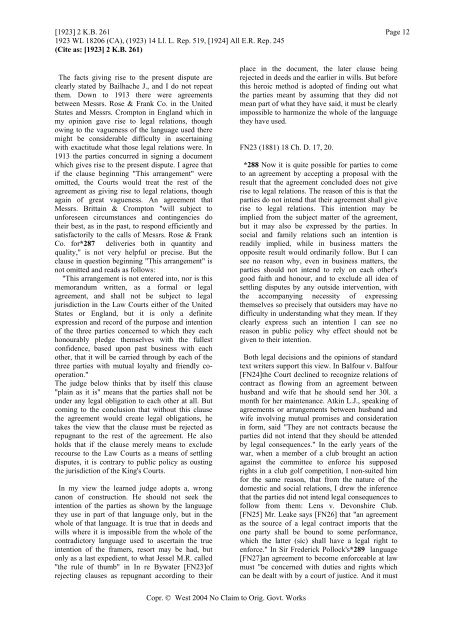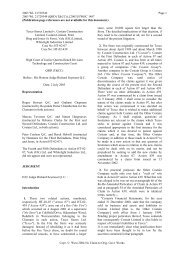Rose - Thomson Reuters
Rose - Thomson Reuters
Rose - Thomson Reuters
You also want an ePaper? Increase the reach of your titles
YUMPU automatically turns print PDFs into web optimized ePapers that Google loves.
[1923] 2 K.B. 261 Page 121923 WL 18206 (CA), (1923) 14 Ll. L. Rep. 519, [1924] All E.R. Rep. 245(Cite as: [1923] 2 K.B. 261)The facts giving rise to the present dispute areclearly stated by Bailhache J., and I do not repeatthem. Down to 1913 there were agreementsbetween Messrs. <strong>Rose</strong> & Frank Co. in the UnitedStates and Messrs. Crompton in England which inmy opinion gave rise to legal relations, thoughowing to the vagueness of the language used theremight be considerable difficulty in ascertainingwith exactitude what those legal relations were. In1913 the parties concurred in signing a documentwhich gives rise to the present dispute. I agree thatif the clause beginning "This arrangement" wereomitted, the Courts would treat the rest of theagreement as giving rise to legal relations, thoughagain of great vagueness. An agreement thatMessrs. Brittain & Crompton "will subject tounforeseen circumstances and contingencies dotheir best, as in the past, to respond efficiently andsatisfactorily to the calls of Messrs. <strong>Rose</strong> & FrankCo. for*287 deliveries both in quantity andquality," is not very helpful or precise. But theclause in question beginning "This arrangement" isnot omitted and reads as follows:"This arrangement is not entered into, nor is thismemorandum written, as a formal or legalagreement, and shall not be subject to legaljurisdiction in the Law Courts either of the UnitedStates or England, but it is only a definiteexpression and record of the purpose and intentionof the three parties concerned to which they eachhonourably pledge themselves with the fullestconfidence, based upon past business with eachother, that it will be carried through by each of thethree parties with mutual loyalty and friendly cooperation."The judge below thinks that by itself this clause"plain as it is" means that the parties shall not beunder any legal obligation to each other at all. Butcoming to the conclusion that without this clausethe agreement would create legal obligations, hetakes the view that the clause must be rejected asrepugnant to the rest of the agreement. He alsoholds that if the clause merely means to excluderecourse to the Law Courts as a means of settlingdisputes, it is contrary to public policy as oustingthe jurisdiction of the King's Courts.In my view the learned judge adopts a, wrongcanon of construction. He should not seek theintention of the parties as shown by the languagethey use in part of that language only, but in thewhole of that language. It is true that in deeds andwills where it is impossible from the whole of thecontradictory language used to ascertain the trueintention of the framers, resort may be had, butonly as a last expedient, to what Jessel M.R. called"the rule of thumb" in In re Bywater [FN23]ofrejecting clauses as repugnant according to theirplace in the document, the later clause beingrejected in deeds and the earlier in wills. But beforethis heroic method is adopted of finding out whatthe parties meant by assuming that they did notmean part of what they have said, it must be clearlyimpossible to harmonize the whole of the languagethey have used.FN23 (1881) 18 Ch. D. 17, 20.*288 Now it is quite possible for parties to cometo an agreement by accepting a proposal with theresult that the agreement concluded does not giverise to legal relations. The reason of this is that theparties do not intend that their agreement shall giverise to legal relations. This intention may beimplied from the subject matter of the agreement,but it may also be expressed by the parties. Insocial and family relations such an intention isreadily implied, while in business matters theopposite result would ordinarily follow. But I cansee no reason why, even in business matters, theparties should not intend to rely on each other'sgood faith and honour, and to exclude all idea ofsettling disputes by any outside intervention, withthe accompanying necessity of expressingthemselves so precisely that outsiders may have nodifficulty in understanding what they mean. If theyclearly express such an intention I can see noreason in public policy why effect should not begiven to their intention.Both legal decisions and the opinions of standardtext writers support this view. In Balfour v. Balfour[FN24]the Court declined to recognize relations ofcontract as flowing from an agreement betweenhusband and wife that he should send her 30l. amonth for her maintenance. Atkin L.J., speaking ofagreements or arrangements between husband andwife involving mutual promises and considerationin form, said "They are not contracts because theparties did not intend that they should be attendedby legal consequences." In the early years of thewar, when a member of a club brought an actionagainst the committee to enforce his supposedrights in a club golf competition, I non-suited himfor the same reason, that from the nature of thedomestic and social relations, I drew the inferencethat the parties did not intend legal consequences tofollow from them: Lens v. Devonshire Club.[FN25] Mr. Leake says [FN26] that "an agreementas the source of a legal contract imports that theone party shall be bound to some performance,which the latter (sic) shall have a legal right toenforce." In Sir Frederick Pollock's*289 language[FN27]an agreement to become enforceable at lawmust "be concerned with duties and rights whichcan be dealt with by a court of justice. And it mustCopr. © West 2004 No Claim to Orig. Govt. Works
















